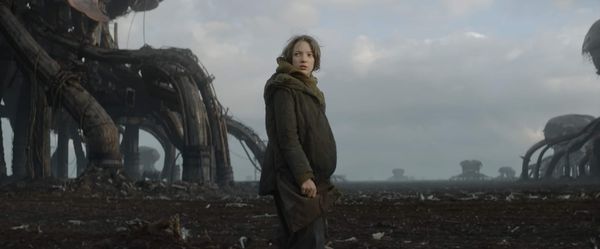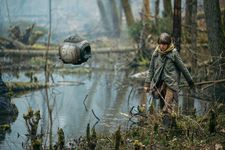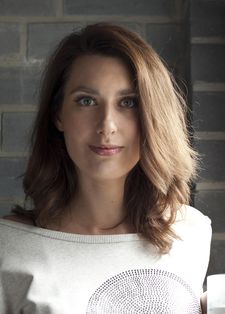 |
| Raffiella Chapman as Vesper Photo: Courtesy of IFC Films. An IFC Films release |
A standout at this year’s genre festivals and now part of the Fantastic Fest line-up, Vesper is a vision of the future which is at once bleak and full of hope. It follows its young heroine (played by Raffiella Chapman) through a collapsed and dramatically altered world where power is concentrated in remote citadels and ordinary people have to scrape by as best they can – until a chance discovery enables her to pursue her longstanding ambitions, and plunges her into an unexpected new role. I was glad of the chance to meet the film’s two writers/directors, Lithuanian Kristina Buozyte and Frenchman Bruno Samper. We had only a short time to speak, plus the challenge of them both doing so in English – the language of the film – but they both had a lot to say.
 |
| The forager Photo: Courtesy of IFC Films. An IFC Films release |
I told them that I feel this is a really important film. I’ve written a bit of science fiction in the past and there was a point early this century when the genre reached something of a crisis point because nobody knew which direction things would go in. Then there was a lot of hesitation around seeing the future as purely bleak, and nothing beyond that. Vesper tries to talk about what might happen afterwards, after things get worse, and how we get out of that kind of situation. Was that the idea behind developing this story?
“Yes, exactly that idea,” says Kristina. “Because we wanted to create a utopia in a dystopia, so we decided to show a very bleak world and then to imagine that, okay, all the bad prognoses come true. What is it then? Let’s say that humanity goes back into a kind of future Middle Ages – is there a way to stand up? But at the same time, we didn't want it to be a negative film. We believe that there is always a way for humans to stand up and to go out from the situation, and Vesper is about that.”
There are also questions about the future being taken away from younger generations, says Bruno. “When we were young, before 2000, we were saying ‘This 2000 is the future,’ like a bit of the future, like a bright future, you know? And today the young generation grows up seeing the news and every day it’s bad news, you know? Every day we say ‘There was no future for the world.’ I was wondering, okay, how are the young generation to grow and have hope in this condition? So the idea was, okay, let's say the world collapsed, let's say it's finished, the world is dead. How can they start to hope, and to start again? And so Vesper, she's lit this little flame, you know? This little light in the darkness that you can take and you can after extend to bring back life again. So that's why we did the project.”
 |
| Kristina Buozyte Photo: Courtesy of IFC Films. An IFC Films release |
Was that why it was important to have a young protagonist, to speak to young people about the world that they'll inherit?
“Yes, it was because of this,” says Katrina, “but also because the young protagonist is still growing and has an open mind, doesn't take already the given rules, and didn't adapt to the world. So who is growing, who is searching, and who is searching for the way how to live, how to go on to, how to fight, just how to be in this world. And also for us, it was very important to create a protagonist that we wouldn't pay attention to ‘Is it a girl or is it a boy?’ because it is not about the gender, it is about the ideas.”
It’s interesting in terms of form as well, I suggest, because of the way in which it explores people working together and ultimately investing in each other and in the future.
They wanted to get away from the idea of a lone hero, Bruno says. “It is also the message of the movie. You know, you have a very strong contrast between the point of view of Jonas, the bad guy, and Vesper. Jonas has got this idea that in fact, life is a struggle. It's the law of the jungle that the stronger survive. There was this idea in our society, there was this idea in politics, there was this idea in business, there was this idea. But when you look at nature, and when you look at the work of many scientists who work upon nature, you see that, in fact, this is not very efficient.
“In nature, what is more efficient is collaboration. I mean, the species will survive, and can evolve, if the species will collaborate between each other or with other species. And collaboration is really more resilient, more productive, has more potential and more possibilities for the future. There is no doubt about that in nature.”
He stresses the importance of Vesper’s relationship with the forest, as well as with other characters, and the way that the film sees people helping each other. I note that despite these connections, Vesper comes from outside the places where power is concentrated in her world – the citadels – which is, again, a break with tradition. In classic science fiction tales, we usually see people with quite a lot of privilege discover the rest of the world. Did they think that change was more likely to come from outside?
 |
| Bruno Samper Photo: Courtesy of IFC Films. An IFC Films release |
“Maybe,” says Katrina. “Maybe it could be like that, that changes could come from outsiders, because probably there is more energy, and more determination and more ambition – because Vesper, in the beginning, wants changes just for herself, so she can make her life better. But during the story, her goal changes a bit, and she understands that it's not only about her alone, she's also connected with her surroundings, as Bruno said, and she’s connected with more and more things.
“Also for us, it was very important that in all the movie, Vesper wants to go to the citadel, but for us, the Citadel was more of a metaphor for this dream, this unreachable, better place. During the movie Vesper will understand something, that maybe this dream place doesn't exist, and maybe it's time to grow up and to create your dream place where you are. So I think that's also a very relevant message.”
Was that also something that they were trying to do with the camerawork? The cameras is really close to her for most of the film, and then it's only at the very end that we see a lot of open space, perhaps representing what's happening for her mentally
Katrina nods. “Yeah, I mean, we wanted to be very close to the character and we wanted to have a flow. We were searching for a flow in camera movement, and also in the music. Because Vesper is a character who is also searching to find a way out and she is going through the flow, so all the movie comes out of that.”
There are many other things which I’d love to explore with them, but we’re short on time, so I ask about the casting of Raffiella Chapman. I spoke with Sebastian Godwin about her last year when she starred in Homebound. He was full of praise for her, and she’s amazing in this.
 |
| The engines of creation Photo: Courtesy of IFC Films. An IFC Films release |
“We made the casting in England,” says Bruno. “It was during the pandemic so the casting was by video. And when we saw Raffi, I mean, straight away we saw Vesper. We had this very strong image of Raffi running in the forest, and we were seeing Vesper running in the forest. There was, if her face, something very modern, something we think represents the young generation. She really embodies this generation for us.
“That was the first contact. When we started to work with her on the set, she was just amazing. She has such maturity in the acting, and such commitment. She was 200% involved in the role. In the mornings she was the first on the set, and really with big energy all the time. And she really was pumping up everybody on the team, she was really a force. So yeah, it was a real pleasure to work with her, and we think she will go really, really far.”
Vesper is released in US cinemas on 30 September and in the UK on 21 October.[film][/film]





















